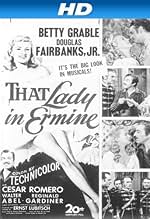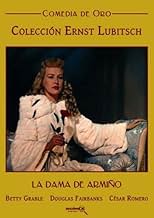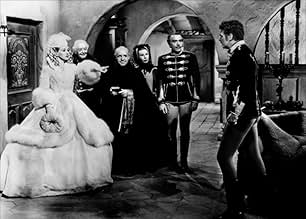VALUTAZIONE IMDb
5,8/10
972
LA TUA VALUTAZIONE
Aggiungi una trama nella tua linguaThat Lady in Ermine tells two parallel stories, both taking place in the small Mittel-European duchy of Bergamo, with one set in the 19th century and the other in the 16th.That Lady in Ermine tells two parallel stories, both taking place in the small Mittel-European duchy of Bergamo, with one set in the 19th century and the other in the 16th.That Lady in Ermine tells two parallel stories, both taking place in the small Mittel-European duchy of Bergamo, with one set in the 19th century and the other in the 16th.
- Regia
- Sceneggiatura
- Star
- Candidato a 1 Oscar
- 2 candidature totali
Lester Allen
- Jester
- (non citato nei titoli originali)
Mary Bear
- Isabella - Ancestor
- (non citato nei titoli originali)
David Bond
- Gabor
- (non citato nei titoli originali)
Harry Carter
- Staff Officer
- (non citato nei titoli originali)
Harry Cording
- Orlando - Ancestor
- (non citato nei titoli originali)
Herbert Evans
- Ancestor
- (non citato nei titoli originali)
Jack George
- Count Giovanni - Ancestor
- (non citato nei titoli originali)
Don Haggerty
- Staff Officer
- (non citato nei titoli originali)
Joe Haworth
- Soldier
- (non citato nei titoli originali)
Ray Hyke
- Albert's Knight
- (non citato nei titoli originali)
Recensioni in evidenza
I enjoyed this film far more than anything had led me to anticipate; from reading other comments here, I suspect it benefits enormously from being seen on a full-size screen in the cinema, in the company of a cheerful and enthusiastic audience. I was lucky enough to have that experience, borne up on ripples of laughter from all around, and had an immensely good time with this undemanding comedy.
For it is as a comedy that it shines, if it shines anywhere at all. The music is nothing special -- in fact, I hadn't realised it *was* a musical, and was very surprised when the assembled ancestors burst into half-spoken lyric -- but I do have to admit that the half-threat, half-promise of 'Oh, what I'll do...' has proved far more catchy than it ever seemed at the time, as it's still going round and round in my head!
The plot, such as it is, largely pivots around the past history of the eponymous Francesca, a sixteenth-century portrait sporting a distinctly anachronistic hairstyle and fur-coat. Her idea on the sanctity of marriage don't quite jibe with those of her distant descendant, the Countess Angelina, and one can almost hear the storyline creaking at the seams under the strain of the Production Code in order to ensure that the heroine arrives unsullied in her much-delayed marriage-bed with the right man...
The romance is scarcely earth-shattering, and in fact the first few scenes, played pretty well straight, verge on the tedious. But where script and film really come to life is in the battle of the sexes that follows. The impudence of Douglas Fairbanks Jr's courtship of Betty Grable's married Angelina is equalled only by Betty-Grable-as-Francesca's pursuit of him in turn, culminating in complete role-reversal in the hilarious fantasy sequence where she -- literally -- sweeps him off his feet. This is probably the comic climax of the plot, although the consequences of the Colonel's understandable confusion are worked out with a deft touch in the remaining two 'acts' of the operetta-structure, and the spectacle of Fairbanks' blissful, bemused awakening is more or less worth the price of admission on its own.
Grable is entirely convincing in establishing her two contrasting characters, wisely gets almost all the (limited) singing opportunities, and shares the honours where the swathes of quotable dialogue in the various verbal duels are concerned. But in the field of unspoken reaction she is really outclassed by her male supporting leads; Fairbanks in particular is an absolute treat in a number of wordless sequences whose set-up and humour is worthy of the silent screen.
This film is too uneven in style to be a classic, varying from sparkling repartee to hackneyed tedium. But at its best it is quite honestly very funny indeed, and brought a round of spontaneous applause and laughter across the auditorium at the end as the lights went up. Out of tune with its times, it may have failed to draw contemporary audiences -- but, on this showing, really didn't deserve to be disowned by both Grable and Preminger, the (uncredited) director. This is no masterpiece, but a thoroughly entertaining minor work, and I for one found myself grinning in remembrance all the way home.
For it is as a comedy that it shines, if it shines anywhere at all. The music is nothing special -- in fact, I hadn't realised it *was* a musical, and was very surprised when the assembled ancestors burst into half-spoken lyric -- but I do have to admit that the half-threat, half-promise of 'Oh, what I'll do...' has proved far more catchy than it ever seemed at the time, as it's still going round and round in my head!
The plot, such as it is, largely pivots around the past history of the eponymous Francesca, a sixteenth-century portrait sporting a distinctly anachronistic hairstyle and fur-coat. Her idea on the sanctity of marriage don't quite jibe with those of her distant descendant, the Countess Angelina, and one can almost hear the storyline creaking at the seams under the strain of the Production Code in order to ensure that the heroine arrives unsullied in her much-delayed marriage-bed with the right man...
The romance is scarcely earth-shattering, and in fact the first few scenes, played pretty well straight, verge on the tedious. But where script and film really come to life is in the battle of the sexes that follows. The impudence of Douglas Fairbanks Jr's courtship of Betty Grable's married Angelina is equalled only by Betty-Grable-as-Francesca's pursuit of him in turn, culminating in complete role-reversal in the hilarious fantasy sequence where she -- literally -- sweeps him off his feet. This is probably the comic climax of the plot, although the consequences of the Colonel's understandable confusion are worked out with a deft touch in the remaining two 'acts' of the operetta-structure, and the spectacle of Fairbanks' blissful, bemused awakening is more or less worth the price of admission on its own.
Grable is entirely convincing in establishing her two contrasting characters, wisely gets almost all the (limited) singing opportunities, and shares the honours where the swathes of quotable dialogue in the various verbal duels are concerned. But in the field of unspoken reaction she is really outclassed by her male supporting leads; Fairbanks in particular is an absolute treat in a number of wordless sequences whose set-up and humour is worthy of the silent screen.
This film is too uneven in style to be a classic, varying from sparkling repartee to hackneyed tedium. But at its best it is quite honestly very funny indeed, and brought a round of spontaneous applause and laughter across the auditorium at the end as the lights went up. Out of tune with its times, it may have failed to draw contemporary audiences -- but, on this showing, really didn't deserve to be disowned by both Grable and Preminger, the (uncredited) director. This is no masterpiece, but a thoroughly entertaining minor work, and I for one found myself grinning in remembrance all the way home.
Ernst Lubitsch's style permeates this unjustly forgotten movie, from a different age of cinema. Oddly enough, any old film noir (or just crime-oriented) feature from its age is revered on a pedestal today, while this wonderful 20th Century-Fox big-budget effort stirs little interest.
It is a remake of a 1927 silent film of the same title, a Corinne Griffith star vehicle from First National Pictures, the distributor that later became part of Warner Brothers. It's a lost film, perhaps because a silent movie of an operetta was hopelessly dated even then. Lubitsch includes fantasy and satire here, with the play-acting performances of stars Grable and Fairbanks delightful in that they make fun of the antiquated Period Costume Film cliches, while simultaneously creating warm and empathetic characters. The elements of satire have given way in modern cinema to vulgarity, as evidenced in the work of Mel Brooks (who remade Lubtisch's hit "To Be Or Not to Be") or my favorite director Ken Russell, yet Lubitsch is able to maintain the high ground even in the silliest of scenes, perhaps aided by the censorship of his day.
The Technicolor photography (by Leon Shamroy) remains stunning and just what any film buff should admire. A couple of oddities struck me as I finally saw this movie, so many decades after release, first the foot-fetish theme that instantly suggests Luis Bunuel, who was working in Hollywood during this period. And by some odd coincidence, the starting point for the movie's fantasy element is the stunning portrait of Gable as a 17th Century ancestor of her main character, which comes to life occasionally. Fairbanks' infatuation with the lady in the portrait is the same starting point as Preminger's greatest movie, "Laura", and Otto ended up completing "Ermine" after Lubitsch's sudden death at the age of 55.
It is a remake of a 1927 silent film of the same title, a Corinne Griffith star vehicle from First National Pictures, the distributor that later became part of Warner Brothers. It's a lost film, perhaps because a silent movie of an operetta was hopelessly dated even then. Lubitsch includes fantasy and satire here, with the play-acting performances of stars Grable and Fairbanks delightful in that they make fun of the antiquated Period Costume Film cliches, while simultaneously creating warm and empathetic characters. The elements of satire have given way in modern cinema to vulgarity, as evidenced in the work of Mel Brooks (who remade Lubtisch's hit "To Be Or Not to Be") or my favorite director Ken Russell, yet Lubitsch is able to maintain the high ground even in the silliest of scenes, perhaps aided by the censorship of his day.
The Technicolor photography (by Leon Shamroy) remains stunning and just what any film buff should admire. A couple of oddities struck me as I finally saw this movie, so many decades after release, first the foot-fetish theme that instantly suggests Luis Bunuel, who was working in Hollywood during this period. And by some odd coincidence, the starting point for the movie's fantasy element is the stunning portrait of Gable as a 17th Century ancestor of her main character, which comes to life occasionally. Fairbanks' infatuation with the lady in the portrait is the same starting point as Preminger's greatest movie, "Laura", and Otto ended up completing "Ermine" after Lubitsch's sudden death at the age of 55.
THE LADY IN ERMINE certainly has its moments, but it can't decide if it wants to be a romance or a comedy. Parts of it are very funny indeed and had me laughing out loud, while others seem to fall as flat as a lead balloon.
Douglas Fairbanks Jr. is handsome and dashing, as usual, providing a much needed surge of energy when he is on screen, but Betty Grable seems uncomfortable in her double role. She's far more enjoyable to watch as the ancestor than she is as the descendant. The opportunity for her to display her most valuable assets (her legs) is limited.
20th Century Fox has surrounded the two leads with good character actors from its stable, including Cesar Romero showing some versatility, Walter Abel in two roles, and Harry Davenport as the likable old retainer. Reginald Gardiner is wasted as Alberto.
It's a shame that the songs are so ordinary and mostly forgettable. Was this the best Fox, the studio that brought us STATE FAIR, could do? All in all, you're not missing much if you don't see it, but it's a pleasantly diverting way to pass an hour and thirty minutes.
Douglas Fairbanks Jr. is handsome and dashing, as usual, providing a much needed surge of energy when he is on screen, but Betty Grable seems uncomfortable in her double role. She's far more enjoyable to watch as the ancestor than she is as the descendant. The opportunity for her to display her most valuable assets (her legs) is limited.
20th Century Fox has surrounded the two leads with good character actors from its stable, including Cesar Romero showing some versatility, Walter Abel in two roles, and Harry Davenport as the likable old retainer. Reginald Gardiner is wasted as Alberto.
It's a shame that the songs are so ordinary and mostly forgettable. Was this the best Fox, the studio that brought us STATE FAIR, could do? All in all, you're not missing much if you don't see it, but it's a pleasantly diverting way to pass an hour and thirty minutes.
I just watched this film on YouTube; it's there for free in version with very good image quality. It was a box office flop, and has a poor reputation among classic film devotees. But if you enjoy musicals, you might want to give it a chance.
I mildly enjoyed it. Fairbanks Jr. Is excellent, giving a spirtited performance with the right touch of believable emotion and light tungue in cheek playfulness. The sets are opulant. Fredrick Holander's music is lovely, though the song lyrics (by Leo Robin?) are mediocre and banal. There are occasional playfully funny moments.
On the down side, the film overall lacks the charm, subtle sexiness, and light touch that Lubitch would have given it, if he had directed the entire thing, and his capabilities were not greatly diminished by very poor health. Grable is OK in the role, but far from the ideal actress-singer for it. I've read that Fox head Zanick wanted to broaden her appeal and put her in more high class roles, so she made three classy pictures and all of them, including this one flopped. (One of them is excellent, and I highly recommend it, "The Shocking Miss Pilgrim".)
That Lady in Ermine seems to have two endings; and I felt let down by the second one. It should have ended when the Fairbanks character rides away, bidding the Grable character a regretful goodby. But then there's a entirely unnecessary scene, which seems tacked on.
I mildly enjoyed it. Fairbanks Jr. Is excellent, giving a spirtited performance with the right touch of believable emotion and light tungue in cheek playfulness. The sets are opulant. Fredrick Holander's music is lovely, though the song lyrics (by Leo Robin?) are mediocre and banal. There are occasional playfully funny moments.
On the down side, the film overall lacks the charm, subtle sexiness, and light touch that Lubitch would have given it, if he had directed the entire thing, and his capabilities were not greatly diminished by very poor health. Grable is OK in the role, but far from the ideal actress-singer for it. I've read that Fox head Zanick wanted to broaden her appeal and put her in more high class roles, so she made three classy pictures and all of them, including this one flopped. (One of them is excellent, and I highly recommend it, "The Shocking Miss Pilgrim".)
That Lady in Ermine seems to have two endings; and I felt let down by the second one. It should have ended when the Fairbanks character rides away, bidding the Grable character a regretful goodby. But then there's a entirely unnecessary scene, which seems tacked on.
In 1948 this was my all-time favorite movie. Betty Grable's costumes were so ravishing that I wanted to grow up to be her and dress like that. Douglas Fairbanks, Jr., was irresistible as the dashing Hungarian officer. Silly and fluffy as this movie might appear at first, when I was eight years old it seemed to me to say something important about relations between men and women. I saw it again the other day; I was surprised to find that it still did.
Lo sapevi?
- QuizIn later years Betty Grable said it was her least favorite of all her movies.
- BlooperIf you watch when the Lady in Ermine is dancing with Colonel Ladislas Karolyi Teglas / The Duke her shoes change from the heels to wedges.
- Citazioni
Col. Ladislas Karolyi Teglas: If one is in love, one doesn't need an umbrella.
- ConnessioniFeatured in The Costume Designer (1950)
- Colonne sonoreOoh! What I'll Do (To That Wild Hungarian)
(uncredited)
Written by Friedrich Hollaender
Lyrics Leo Robin
Sung by Betty Grable and chorus
Danced by Betty Grable and Douglas Fairbanks Jr.
I più visti
Accedi per valutare e creare un elenco di titoli salvati per ottenere consigli personalizzati
- How long is That Lady in Ermine?Powered by Alexa
Dettagli
Botteghino
- Budget
- 2.484.000 USD (previsto)
- Tempo di esecuzione
- 1h 29min(89 min)
- Colore
- Proporzioni
- 1.37 : 1
Contribuisci a questa pagina
Suggerisci una modifica o aggiungi i contenuti mancanti

































